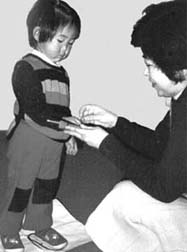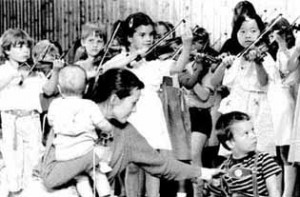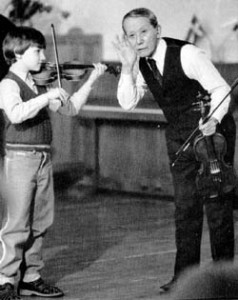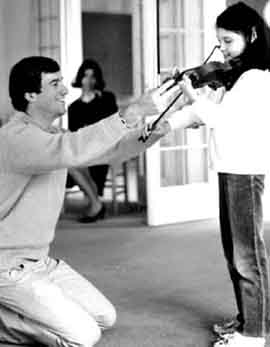The Principles of the Mother-Tongue Method and their Application
Every Child is Able to Learn
Dear parents, your child learned to speak because you provided him the opportunity. If a child is surrounded after birth by musical sounds and stimulation, is later encouraged to actively participate in music and to learn to play an instrument, and smallest successes are rewarded with praise and enjoyment, then pleasure in music, self-confidence, and a zest for learning will be the result. Herewith, an essential requirement is established for the unfolding of musical qualities.
 The Early Beginning
The Early Beginning
Science has shown that at no other age is a child capable of learning so fast, so intensely, and so broadly as when of pre-school age. The collected experiences in this developmental phase stamp their influence on the rest of his life. The Mother-Tongue Method is tailored exactly to the learning psychology of small children. For this reason, it is possible to begin lessons at age three or four. The exposure to good music cannot begin early enough, however. Already in the pre-natal phase, peaceful and sensitive sounds show their influence on the developing individual.
1
Parental Support
You, as parents, are the best specialists for child-appropriate learning, for you successfully taught your child to speak. If you also want to open the door to music for your child, then you should consider the following points:
Practice with your child every day, even when some days there is less time than necessary. If possible, practice should always occur at the same time of day and it should fit well into the daily routine.
Your child learns at his own tempo, exactly like learning to walk and talk.
Allocate enough time for practice and try to avoid distractions from telephone calls, neighbors, and other family members. Your child will be glad to have your full attention and will come to treasure this time that belongs fully to him.
The ability to concentrate on one single point at a time is the first and most important step that your child must learn. Anyone who does not learn this will suffer a lifetime under his own capriciousness. Difficult tasks can only be mastered when one fully strives to do so. Examples abound: Balancing on a balance beam or cutting with a sharp knife need our undivided attention. The same applies to playing an instrument. Even when several different things need to be improved, we should avoid trying to fix everything at once. All young beginners will be overwhelmed and become quickly frustrated if they are expected to concentrate on posture, intonation, bow angle, tone, and expression, all at the same time.
A harmonic musical development requires consequence paired with encouragement. You should follow your intention to open the world of music for your child with the same persistence as you do in other areas, such as cleanliness or adherence to regular meal- and bedtimes. It is a part of life that things do not always run smoothly. But do not give up! It is important to be persistent when pursuing long-term goals.
1
Listen
Your child should listen to the “Suzuki” or “Step by Step” CD every day. In this way, the student will develop an awareness for beautiful tone, clear rhythm, proper intonation, and musical expressiveness from the very beginning. This ear training is the most important prerequisite for learning new pieces in the first years of lessons. Always remember the principle of learning to speak. Without being literally bathed in speech, learning the mother tongue would be impossible. And just as with language, your child need not always listen attentively. The CD may be played in the background as he plays, baths, eats, or rides in the car.
1
Learning by Ear
An important characteristic of the Mother-Tongue Method is learning without written music during the beginning phase. As your child plays, training of the ear, concentration on rhythm and intonation, attention to posture and movement patterns, tone, and expression are the central themes. In this way, elementary relationships between hearing, conception, feeling, and playing can flow directly together. From the very beginning, your child experiences music as a living whole, not as something to be mastered analytically. This strategy can also be observed in the natural learning of speech: first talk, then read.
1
Observation and Imitation
Pre-school children possess a remarkable ability to imitate much of what they see and hear. They rapidly grasp simple songs and can learn the necessary movements for instrumental playing very easily.
Encouragement
Don’t be stingy with praise, since anyone who has tried to coax beautiful sounds from a violin knows how difficult this is. Suzuki always complimented his students after they played. He explained that, at first, it is the effort that counts and only later the result. His standard sentence was: “Very good, can you…(this or that) even better?” He always stressed that parents should be relaxed and calm while working with their children, since tranquillity and cheerful concentration will be reflected in them. Constructive work can only unfold in an atmosphere that is warm and friendly.
Review and Internalization
In the beginning, your child should regularly repeat all previously learned pieces and exercises. Just as in learning to speak, the entire vocabulary and grammar are used, not just the most recently learned words. In this way, your child gradually expands his concentration, memory, and performance abilities, and learning is proceeding simultaneously on three different levels:
- Solidifying and deepening of skills through repetition.
- Expanding skills through work on the new piece.
- Preparatory work for upcoming challenges via small exercises and listening to future pieces on the CD.
The repertoire is not only being constantly expanded, it is also being refined and internalized. The consequent improvement of previously learned pieces, paired with preparation for the next musical steps, drives the natural learning processes steadily and automatically forwards.
1
Suzuki summarized the outcome of this learning process with the short formula:
Ability breeds further ability!
 Aquarelle painted by Shinichi Suzuki:
Aquarelle painted by Shinichi Suzuki:
Man is the son of his environment.
1
The Stimulating Environment
Dear parents, your own relationship to music has a substantial impact. Can your child experience an interest and enthusiasm for music in you? The creation of a stimulating musical environment will not only benefit your child.
- Play music of high quality for your child regularly.
- Take your child to lesson events for other children often.
- Accompany your child to student recitals, workshops and concerts.
Improvise small house concerts for relatives and friends, or for the other parent who cannot regularly attend lessons. Your active support is absolutely necessary if you want your child to experience the world of music at an early age. Music will not only enrich your child’s life. It will awaken a sense for order, harmony and beauty in everyone involved.
 The Mother-Tongue Method is based on an entirely natural event — the learning of the mother tongue. This process is occurring every day and demonstrates, in a most impressive manner, the incredible learning potential of small children.
The Mother-Tongue Method is based on an entirely natural event — the learning of the mother tongue. This process is occurring every day and demonstrates, in a most impressive manner, the incredible learning potential of small children.




